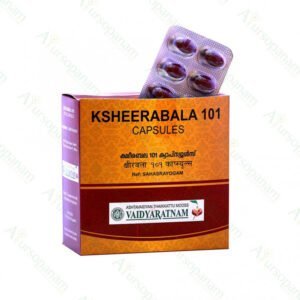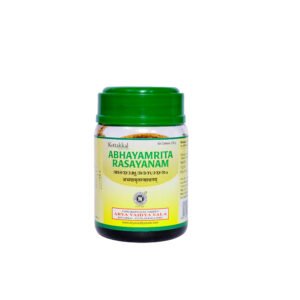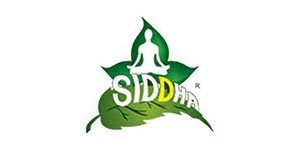Rakta or blood is the body tissue that courses through the entire body facilitating metabolism and nourishment. Raktamruth is an elixir for improving the quality and function of this life-giving fluid that courses through the entire body.
Deranged Pitta dosha manifests foremost in the Rakta Dhatu or blood, giving way to poor digestion, skin disorders, pallor and overall ill-health. Rakthamruth is a rich hematinic formula that readily improves the blood heme level and stimulates function of liver and spleen. The sweet and mild alcoholic base makes it palatable for adults and kids alike.
Features & Benefits
- Rakthamruth us an excellent remedy for chronic ill health of skin. Supports and strengthens the skin tissue against inflammation and infection. Very effective in the treatment of Karappan diseases, a group of skin reactions and lesions categorised by traditional Balavaidyas (Peadiatric Vaidyas).
- It improves heart health and optimises circulation of blood and lymph.
- Rakthamruth is an excellent remedy for decreased liver function. Beneficial in the management of fibrotic changes in the liver.
- It is an excellent anti-oxidant activity. It flushes out metabolic waste and toxins from the body. Purifies blood. Endows the user with healthy skin and hair.
- Good remedy for lack of appetite, chronic fatigue and malnourishment. Stimulates the taste buds and facilitates absorption in the gut. Improves heme levels in the blood.
- Effective carminative. Relieves abdominal gas and flatulence. Smoothens gut function.
- Prevents recurrent upper respiratory tract infections, wheezing and sore throat. Enhances immunity.
- Rakthamruth is deeply nourishing and rejuvenating. Beneficial in remedying lethargy and general debility.
Dosage and Instructions
- Adult: 25-30 ml of Rakthamruth twice or thrice daily after food.
- Child: 10-15 ml of Rakthamruth once or twice daily after food.
Key Ingredients
Hareethaki (Terminalia chebula)
Popularly known as Indian walnut for its innumerable benefits or Indian hog plum in English, it is extremely valuable for its role in improving hair health. It is useful for treating scalp infections like dandruff, itching and hair fall. It also strengthens them from the roots, prevents breakage and loss of hair and bestows silky soft smooth hair. Chebulic Myrobalan is one of the three key ingredients in Triphala, a natural compound that provides overall support for digestive function and helps ensure that the digestive tract works at optimal levels. The Ayurvedic Pharmacopoeia of India has documented the use of the powdered herb in intermittent fevers and chronic fevers, anemia and polyuria. Chebulic Myrobalan can also be used to treat gastrointestinal and respiratory disorders.
Amalaki (Emblica officinal)
It is commonly known as the Indian gooseberry is high in Vitamin C and natural antioxidants known as flavonoids and polyphenols. When used for hair treatments, it is found to strengthen and condition follicles down to the roots. Amla oil can promote hair growth, reduce dandruff, and prevent the graying of hair.
Vibhithaki (Terminalia Bellerica)
Known as beach almonds or Bedda nut tree, it is rich in Vitamin C, and other antioxidants that nourishes the hair roots. Bibhitaki helps in making the roots of the hair stronger, minimizing hair fall and preventing premature graying of hair strands.
Pippali (Piper longum)
Pippali is known as “Tridoshic” herb as it suits all body types. Thus regular consumption of Pippali in suggested quantity can help you to immune your body to quite an extent. Pippali has Anti-microbial, Anti-inflammatory activity. Consumption of Pippali is said to exhibit anti spasmodic action and hypoglycaemic effect which is believed to lower blood sugar level. It is also reported to be antagonist in respiratory depression. Also due to its cooling post-digestive effect consumption of Pippali is considered as a safe and effective option to avoid all sorts of digestive disorders.
Maricha (Piper nigrum)
It is native to Western Ghats of India. It is cultivated for its fruit, which is widely used as spice and in traditional Indian medicine preparation. Black pepper is an appetizer and carminative commonly used in the treatment of digestive system related complaints like dyspepsia, indigestion, flatulence, nausea, diarrhoea and colic pain. in respiratory system it acts like Expectorant used in Cough, cold and chest congestion. Externally used as analgesic and in Vitiligo it stimulates the production of pigments.
Shunti(Zingiber Officinalae )
Due to its strong flavor, Ginger is an essential ingredient in many Asian cuisines. Its therapeutic benefits have been recorded in Ayurvedic and Traditional Chinese Medicine. Ginger is a potent anti-nauseatic and is beneficial in treating upset stomach.Gingerol and shogaol, active components of Ginger, suppress gastric contractions. Both the fresh and dried rhizomes of Ginger suppress gastric secretion and reduce vomiting. The compounds 6-gingerol and 6-shogaol have a number of pharmacological properties, including antipyretic, analgesic, antitussive and hypotensive properties.
Daruharidra (Berberis aristata)
Also known as Haldi, this vibrant yellow coloured spice checks the worsening of pitta doshas like jaundice. The powerful anti-inflammatory and antiseptic properties of turmeric help in evading infections and treats various skin conditions. Tree Turmeric is a revered herb in Ayurvedic medicine. Possessing antibacterial, anti-inflammatory, antipyretic and antiseptic properties, the herb is used as a cholagogue, stomachic, laxative and diaphoretic.
Haridra (Curcuma longa)
Haridra is also called known as Curcuma longa. The anti-inflammatory and antioxidant properties of Haridra assist in preventing the progression of diabetes related changes in organs like the kidneys, retina, nerve cells and minute blood vessels in the body . he root of the herb, used either fresh or dried, has a host of medicinal benefits. It acts as a carminative and also enhances the complexion and skin-tone. in addition, Turmeric can be used to combat liver damage, respiratory disorders and ulcers.
Mustha (Cyperus rotundus)
Scientifically known as Cyperus rotundus, Mustha helps improve digestion due to its Deepan and Pachan properties, if taken in the recommended dosage. Mustha oil is an effective home remedy for managing stomach disorders due to its antispasmodic and carminative properties.
Madhuka (Glycyrrhiza Glabra)
Roots as choorna are mainly used for the Ayurvedic preparations as well as single drug. Yashtimadhu oil externally used for various skin conditions as well as decoctions is used internally for respiratory disorders and digestive disorders.
Draksha (Vitis Vinifera.)
Commonly known as grapes, it is used in both dry and wet form. Its juice is given to children mixing with water it relieves constipation. Regular application of Grapes in the form of a face pack protects skin from harmful ultraviolet radiation. It is used in the preparation of asavas and arishtas.
Sarkara (Saccharum Officinarum.)
Commonly known as the sugarcane, its roots are used for the therapeutic purposes. Having properties aphrodisiac (arouse sexual desires), laxative, cooling, demulcent, antiseptic, and tonic. Sugarcane juice is very useful in jaundice conditions.





















































Ratings & Customer Reviews
Reviews
There are no reviews yet.